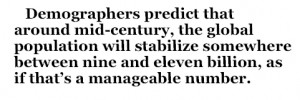 The world’s human population passed seven billion souls last October with little fanfare. There were a few ripples of concern but, incredibly, others thought it was a moment for celebration. You’d think we’d won a prize for procreation or something. While progressives worry about the long-term effects of overpopulation, they offer few if any solutions. Conservative thought suggests there is nothing to worry about—that technology and the free market of ideas will solve any and all problems caused by an expanding global population. That ‘growth’ in all its incarnations is a good thing.
The world’s human population passed seven billion souls last October with little fanfare. There were a few ripples of concern but, incredibly, others thought it was a moment for celebration. You’d think we’d won a prize for procreation or something. While progressives worry about the long-term effects of overpopulation, they offer few if any solutions. Conservative thought suggests there is nothing to worry about—that technology and the free market of ideas will solve any and all problems caused by an expanding global population. That ‘growth’ in all its incarnations is a good thing.
Demographers predict that around mid-century, the global population will stabilize somewhere between nine and eleven billion, as if that’s a manageable number. Why they think population growth will finally grind to a halt is bewildering to me.
I suppose there is an assumption that, as the world becomes more educated, affluence will follow and populations will decline. What it really means is that, as families become more connected to the developed world, they will prefer to spend their available incomes on stuff instead of kids. That alone is a mixed bag and a troubling possibility: the very future of the planet depends upon a less consumptive, more sustainable population and it cannot survive if all seven, or nine, or eleven billions choose to live like Americans. The American Dream is not sustainable.
We’ve heard the numbers again and again. The United States represents about 4% of the world’s human population but consumes almost 30% of its resources. If even half of the world’s 2050 population consumes at the same rate as us, they’d be gobbling up seven and a half times MORE resources than exist! The math just doesn’t work.
But what can we do? Even the most cheerfully optimistic (delusional) mainstream environmentalists agree there’s no  easy way to accomplish negative population growth. It’s an absurdity to think voluntary population reduction is a viable notion. Governments are not, in the main, going to take draconian measures (The China Solution for example) to reduce population. Any government in this country that tried to take even the mildest of steps, like eliminating tax exemptions for families that bore more than two children, would be driven from office and out of the country. On a rail.
easy way to accomplish negative population growth. It’s an absurdity to think voluntary population reduction is a viable notion. Governments are not, in the main, going to take draconian measures (The China Solution for example) to reduce population. Any government in this country that tried to take even the mildest of steps, like eliminating tax exemptions for families that bore more than two children, would be driven from office and out of the country. On a rail.
Pundits and social scientists may promote their Nine Point Plans for Population Reduction and talk about an ideal world where the human race takes a hard magnanimous look at itself and says meekly, ‘Damn, there are WAY too many of us…we better stop having kids for a century or two.’
But it’s not going to happen.
What other options do we have? Ed Abbey used to insist, “Our only hope is Catastrophe!” In 1986, Abbey scribbled in his journal, “…oh God when will your vengeance descend upon these mean ugly people? I long for the day of the coming collapse.” He died three years later, his prayer unanswered.
And certainly many others, struggling with a solution to overpopulation and carefully avoiding the personal image of the human suffering such an apocalypse would cause, share his view.
And maybe it’s the way it will happen, but I doubt it. So far, science seems to keep outwitting the germs, and, no matter how insane and murderous we may act as a species, no matter how frequently or intensely we make war on each other, we eventually emerge more fertile and productive than ever. World War II cost 50 million lives and the destruction of trillions of dollars in destruction. Yet, the war eventually generated the greatest population and building boom in the history of the world.
Those who prefer the Apocalypse Solution may pray for earthquakes and famines and asteroids all they want. But it doesn’t seem like a viable option to me.
There is another possibility. The Hope of Severe Infertility. It’s hardly a new idea and it gets talked about more frequently these days. Scientists have already noted a decline in male fertility world-wide. Studies show that about 1.5% of all men were functionally sterile in 1938. Now it’s up to 8-12%.
Still, the threat, or the hope (choose one,) remains.
Here, the ‘solution’ comes in conflict with both mainstream progressive and conservative thinking. The contradictions could easily cause them to develop a terrific headache and split in two. Bear with me a moment.
If the world’s population should experience a precipitous decline due to wide-spread infertility, it has to be caused by something. It won’t ‘just happen.’ For those who hope God might point a wrathful finger at the earth and render us all barren, keep praying. It might work. But there are other human-made processes that may have the same effect.
Years ago, I stumbled upon a fascinating fact—one of those stories that makes for great party conversation (if I ever went to a party). An article in Newsweek magazine featured the findings of Dr. Irwin Goldstein, an impotency expert from Boston University. Goldstein issued a grave warning to men who regularly ride bicycles. His studies showed that when a man rides a bike with a standard seat, the kind that looks like a mutated black banana, his body weight flattens his main penile artery. This artery is essential for an erection and, from a man’s perspective, what could be more essential than that?
 Goldstein believed that, over time, riding a bike and putting that kind of long-term pressure on the penile artery can irreversibly damage the vessel (“All hands abandon ship!”). The worried doctor was seeing several new patients a week. Among them was Ed Pavelka of “Bicycling Magazine.” Pavelka complained that his years of intense marathon bike riding had left him “as soft as an over-cooked rigatoni.” Not exactly a macho biker pick-up line.
Goldstein believed that, over time, riding a bike and putting that kind of long-term pressure on the penile artery can irreversibly damage the vessel (“All hands abandon ship!”). The worried doctor was seeing several new patients a week. Among them was Ed Pavelka of “Bicycling Magazine.” Pavelka complained that his years of intense marathon bike riding had left him “as soft as an over-cooked rigatoni.” Not exactly a macho biker pick-up line.
But what are the odds that enough of us will take to the bicycle to cause this kind of impotency on a grand scale? Not likely.
Recently a story published in “Fertility & Sterility” magazine suggested that “wi-fi radiation may also be giving us more infertility by decreasing sperm motility and damaging DNA in sperm.” A story at NaturalNews.com said, “Researchers in Argentina took semen samples from 29 healthy men, and they measured sperm motility after four hours of exposure to wi-fi radiation from a laptop wirelessly connected to the internet. Sperm in the control group was kept at the same temperature for the same amount of time, but was not exposed to wi-fi radiation….Of the sperm exposed to the wi-fi radiation, 25 percent stopped swimming. Only 14 percent of unexposed sperm ceased to swim after four hours. Wi-fi sperm also showed 9 percent DNA fragmentation, or irreversible damage in the genetic code, while sperm in the control group only showed 3 percent.”
But the study pointed out that the infertility effect is only noticeable when the laptop user sets it directly on his lap, for hours at a time. The odds of drastic population declines based on excessive laptop use are remote.
So what is the answer? How can infertility save the world? It’s the solution that will confound and dismay everyone, from the most ardent ‘progressive’ to the most strident ‘conservative,’ for precisely the opposite reason.
 What are the most potent causes of infertility? They’re all around us—men who smoke have sperm counts that are 13 to 17% lower than non-smokers. Men exposed to agricultural pesticides were 10 times more likely to experience infertility problems. A chemical called chlordane has been found in 75% of all homes and is believed to contribute to infertility. Then there’s the car exhaust, specifically benzopyrene, which has a profound negative effect on women’s ovaries. Chemical solvents like xylene, acetone, trichlorethylene, and other petroleum distillates have caused spontaneous abortions in women. Monosodium Glutanate (MSG) has been shown to reduce the success of pregnancies. Chemicals used to make silicon chips have caused a dramatically increased miscarriage rates in women who worked with these solvents.
What are the most potent causes of infertility? They’re all around us—men who smoke have sperm counts that are 13 to 17% lower than non-smokers. Men exposed to agricultural pesticides were 10 times more likely to experience infertility problems. A chemical called chlordane has been found in 75% of all homes and is believed to contribute to infertility. Then there’s the car exhaust, specifically benzopyrene, which has a profound negative effect on women’s ovaries. Chemical solvents like xylene, acetone, trichlorethylene, and other petroleum distillates have caused spontaneous abortions in women. Monosodium Glutanate (MSG) has been shown to reduce the success of pregnancies. Chemicals used to make silicon chips have caused a dramatically increased miscarriage rates in women who worked with these solvents.
And then there are the products that are around us every day—laundry detergents, air-freshening products, fabric softeners, glass cleaners, carpet cleaners, hard-surface cleaners, and oven cleaners,
Are we risking infertility each time we reach for the Windex Aerosol, Formula 409, Lemon Fresh Pine-Sol or Simple Green All Purpose Cleaner?
The answer may be a resounding YES.
And there’s the irony…Progressives worry about overpopulation and seek ways to bring it under control and even reduce it. But they have also historically believed in the strict regulation and often the total elimination of chemicals that might cause harm to the general public. Consequently they have a real dilemma. They can oppose the massive use of toxins and fight for their removal, but by so doing, they may also eliminate the one option that might slowly bring our global population down to a reasonable level.
Conservatives support and encourage an ever-expanding population and an economy that grows with it, based on the idea that all growth is good. They believe that a declining population would be a disaster. But they also oppose the regulation of toxic chemicals. They believe agencies like the FDA and the EP are harassing business and stalling growth. But by encouraging their continued wide-spread use, they may eventually contribute to a dramatic population collapse.
In the end, obviously, neither of these options is very appealing. The idea of choosing between slowly killing our species by destroying our ability to reproduce versus waiting for a comet to hit the planet is not something to cheer about. But it does say something about the way we’ve allowed our future and our destiny to get away from us. We no longer have any real control over our fate. Or maybe that’s the point…
We never did.
To read Jim’s other “Take it or Leave it” articles from this issue, follow these links:
George Clooney, President Obama, and the Loyal Voice of Dissent
Moab U, Tar Sands, and Sustainability
The 99% (We Don\’t Like Each Other Very Much…)
To read the PDF version of this article, click here.
Don’t forget the Zephyr Ads! All links are hot!




ah yes, that’s the point! “We never did”–think about it, we’re just a pack of humanoid mammals playing out an animal destiny like any other. Almost always when an animal population out-strips the carrying capacity of its environment, the population crashes. In the case of Homo Sapiens Industrialis, the entire planet is our environment. So when we out-strip it, the crash is going to be something terrible to behold. And there is no way we can avoid it, because we can’t help ourselves. I do believe Abbey was right. It’s not a question whether or not catastrophe will engulf the species, it’s a question of when and how.
The “developed” world has been in negative population growth territory for decades. The only hope for our pensions is to import young workers.
Overpopulation itself is the most likely “Catatrophe” unless a giant meteor or asteroid strikes first.
Agree 100% with Tom. We will have barely any space to keep all these people.